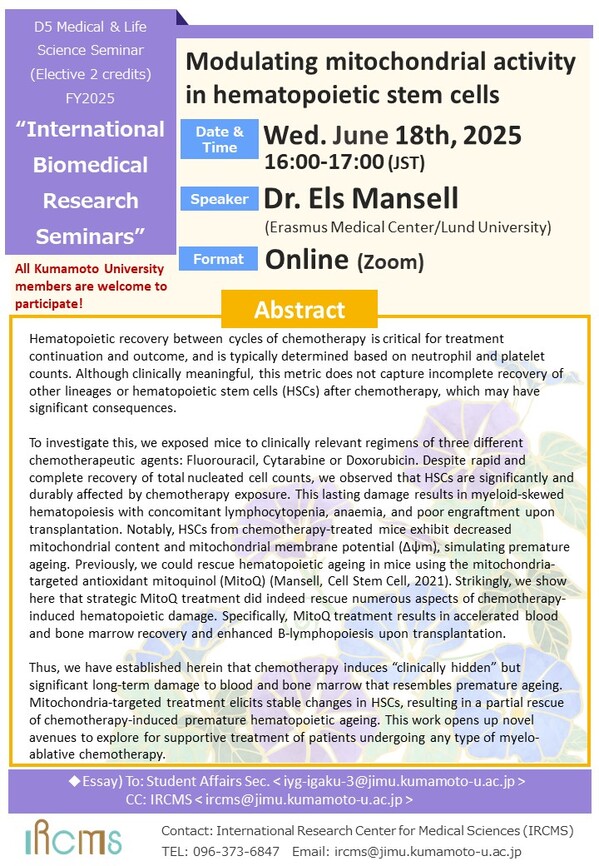- HOME
- News & Events
- [Jun. 18] D5 Seminar-Dr. Els Mansell (Erasmus Medical Center/ Lund University)
News & Events
[Jun. 18] D5 Seminar-Dr. Els Mansell (Erasmus Medical Center/ Lund University)
May 21 2025
The "D5 Medical & Life Science Seminar" course will be offered by International Research Center for Medical Sciences (IRCMS). It will run from May 2025 to March 2026, with lectures given by scientists who are affiliated with IRCMS or in collaboration with researchers at IRCMS. The lectures will be given once a month, in English, and by leading scientists in the relevant research field. Students will be taught: 1) how normal physiological functions are maintained in the human body; 2) how these systems become abnormal under certain pathophysiologic conditions; 3) why stem cells are important in animal development and homeostasis; 4) how stem cell-based approaches can help us understand disease mechanisms and find potential cure for diseases related to stem cell malfunction (e.g., cancer, aging).
Anyone who wants to join is welcome.
For students who have registered for the course, please check your attendance in Moodle.
Date : June 18, 2025 (Wednesday)
Format : Online
Time : 16:00 - 17:00 (JST)
Speaker : Dr. Els Mansell (Erasmus Medical Center/ Lund University)
Title : Modulating mitochondrial activity in hematopoietic stem cells
Abstract :
Hematopoietic recovery between cycles of chemotherapy is critical for treatment continuation and outcome, and is typically determined based on neutrophil and platelet counts. Although clinically meaningful, this metric does not capture incomplete recovery of other lineages or hematopoietic stem cells (HSCs) after chemotherapy, which may have significant consequences.
To investigate this, we exposed mice to clinically relevant regimens of three different chemotherapeutic agents: Fluorouracil, Cytarabine or Doxorubicin. Despite rapid and complete recovery of total nucleated cell counts, we observed that HSCs are significantly and durably affected by chemotherapy exposure. This lasting damage results in myeloid-skewed hematopoiesis with concomitant lymphocytopenia, anaemia, and poor engraftment upon transplantation. Notably, HSCs from chemotherapy-treated mice exhibit decreased mitochondrial content and mitochondrial membrane potential (∆ψm), simulating premature ageing. Previously, we could rescue hematopoietic ageing in mice using the mitochondria-targeted antioxidant mitoquinol (MitoQ) (Mansell, Cell Stem Cell, 2021). Strikingly, we show here that strategic MitoQ treatment did indeed rescue numerous aspects of chemotherapy-induced hematopoietic damage. Specifically, MitoQ treatment results in accelerated blood and bone marrow recovery and enhanced B-lymphopoiesis upon transplantation.
Thus, we have established herein that chemotherapy induces "clinically hidden" but significant long-term damage to blood and bone marrow that resembles premature ageing. Mitochondria-targeted treatment elicits stable changes in HSCs, resulting in a partial rescue of chemotherapy-induced premature hematopoietic ageing. This work opens up novel avenues to explore for supportive treatment of patients undergoing any type of myelo-ablative chemotherapy.
2-3 Major Papers
1. Mansell et al., Cell Stem Cell, 2021. DOI: 10.1016/j.stem.2020.09.018
2. Rystrom, Mansell et al., Stem Cell Reports, 2023. Mansell et al, Cell Stem Cell, 2021. DOI: 10.1016/j.stem.2020.09.018
3. Oburoglu, Mansell et al., EMBO reports, 2022. DOI: 10.15252/embr.202154384
Flyer: (Click to enlarge)

